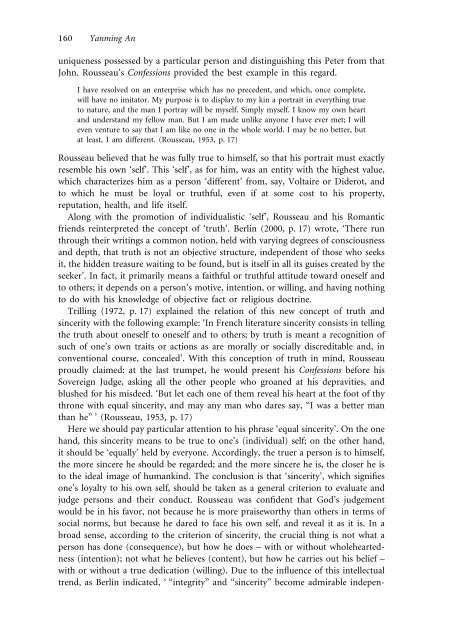Western sincerity and Confucian Cheng
You also want an ePaper? Increase the reach of your titles
YUMPU automatically turns print PDFs into web optimized ePapers that Google loves.
160 Yanming An<br />
uniqueness possessed by a particular person <strong>and</strong> distinguishing this Peter from that<br />
John. Rousseau’s Confessions provided the best example in this regard.<br />
I have resolved on an enterprise which has no precedent, <strong>and</strong> which, once complete,<br />
will have no imitator. My purpose is to display to my kin a portrait in everything true<br />
to nature, <strong>and</strong> the man I portray will be myself. Simply myself. I know my own heart<br />
<strong>and</strong> underst<strong>and</strong> my fellow man. But I am made unlike anyone I have ever met; I will<br />
even venture to say that I am like no one in the whole world. I may be no better, but<br />
at least, I am different. (Rousseau, 1953, p. 17)<br />
Rousseau believed that he was fully true to himself, so that his portrait must exactly<br />
resemble his own ‘self’. This ‘self’, as for him, was an entity with the highest value,<br />
which characterizes him as a person ‘different’ from, say, Voltaire or Diderot, <strong>and</strong><br />
to which he must be loyal or truthful, even if at some cost to his property,<br />
reputation, health, <strong>and</strong> life itself.<br />
Along with the promotion of individualistic ‘self’, Rousseau <strong>and</strong> his Romantic<br />
friends reinterpreted the concept of ‘truth’. Berlin (2000, p. 17) wrote, ‘There run<br />
through their writings a common notion, held with varying degrees of consciousness<br />
<strong>and</strong> depth, that truth is not an objective structure, independent of those who seeks<br />
it, the hidden treasure waiting to be found, but is itself in all its guises created by the<br />
seeker’. In fact, it primarily means a faithful or truthful attitude toward oneself <strong>and</strong><br />
to others; it depends on a person’s motive, intention, or willing, <strong>and</strong> having nothing<br />
to do with his knowledge of objective fact or religious doctrine.<br />
Trilling (1972, p. 17) explained the relation of this new concept of truth <strong>and</strong><br />
<strong>sincerity</strong> with the following example: ‘In French literature <strong>sincerity</strong> consists in telling<br />
the truth about oneself to oneself <strong>and</strong> to others; by truth is meant a recognition of<br />
such of one’s own traits or actions as are morally or socially discreditable <strong>and</strong>, in<br />
conventional course, concealed’. With this conception of truth in mind, Rousseau<br />
proudly claimed: at the last trumpet, he would present his Confessions before his<br />
Sovereign Judge, asking all the other people who groaned at his depravities, <strong>and</strong><br />
blushed for his misdeed. ‘But let each one of them reveal his heart at the foot of thy<br />
throne with equal <strong>sincerity</strong>, <strong>and</strong> may any man who dares say, “I was a better man<br />
than he” ’ (Rousseau, 1953, p. 17)<br />
Here we should pay particular attention to his phrase ‘equal <strong>sincerity</strong>’. On the one<br />
h<strong>and</strong>, this <strong>sincerity</strong> means to be true to one’s (individual) self; on the other h<strong>and</strong>,<br />
it should be ‘equally’ held by everyone. Accordingly, the truer a person is to himself,<br />
the more sincere he should be regarded; <strong>and</strong> the more sincere he is, the closer he is<br />
to the ideal image of humankind. The conclusion is that ‘<strong>sincerity</strong>’, which signifies<br />
one’s loyalty to his own self, should be taken as a general criterion to evaluate <strong>and</strong><br />
judge persons <strong>and</strong> their conduct. Rousseau was confident that God’s judgement<br />
would be in his favor, not because he is more praiseworthy than others in terms of<br />
social norms, but because he dared to face his own self, <strong>and</strong> reveal it as it is. In a<br />
broad sense, according to the criterion of <strong>sincerity</strong>, the crucial thing is not what a<br />
person has done (consequence), but how he does – with or without wholeheartedness<br />
(intention); not what he believes (content), but how he carries out his belief –<br />
with or without a true dedication (willing). Due to the influence of this intellectual<br />
trend, as Berlin indicated, ‘ “integrity” <strong>and</strong> “<strong>sincerity</strong>” become admirable indepen-


